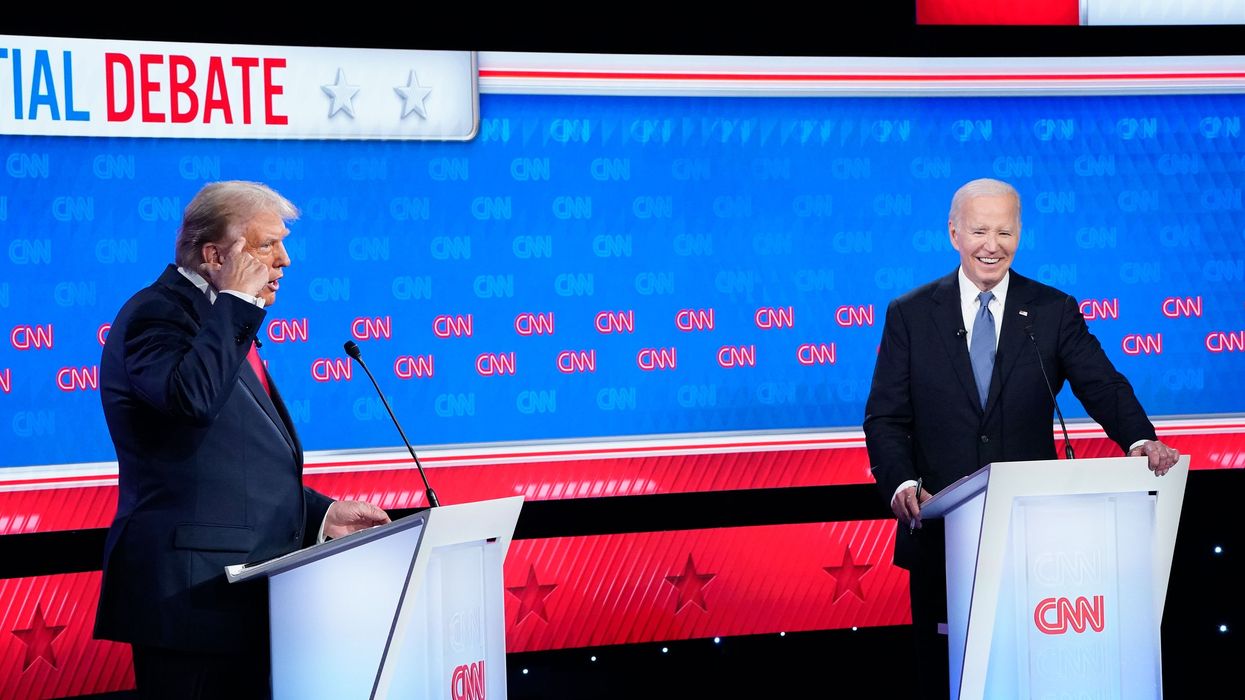Johnson is the executive director of the Election Reformers Network, a national nonpartisan organization advancing common-sense reforms to protect elections from polarization.
The talk is all about President Joe Biden’s recent debate performance, whether he’ll be replaced at the top of the ticket and what it all means for the very concerning likelihood of another Trump presidency. These are critical questions.
But Donald Trump is also a symptom of broader dysfunction in our political system. That dysfunction has two key sources: a toxic polarization that elevates cultural warfare over policymaking, and a set of rules that protects the major parties from competition and allows them too much control over elections. These rules entrench the major-party duopoly and preclude the emergence of any alternative political leadership, giving polarization in this country its increasingly existential character.
That broader dysfunction was also on display during the debate in the simple fact of the binary choice on stage: Trump vs Biden, a set of options that 67 percent of voters said they don’t want.
Outside of politics it seems axiomatic: more options, better outcomes. Choice — and the innovations that create new choices — underlie economic prosperity, individual self-determination and the decline of dogma. But in American politics, we have only two choices, the Republican and Democratic parties — now, and seemingly forever ahead.
Practically half (49 percent) of the country does not affiliate with either party, becoming, in effect, the politically homeless. They include many conservatives dismayed by Trump but unable to vote for the party they’ve always opposed. A new cohort could well join the homeless if Democratic insiders stick with a presidential candidate half the party sees as unfit for the Oval Office.
Like so much else that’s wrong in our democracy, lack of choice goes back to a set of stupid rules, including rules allowing partisan legislatures to draw districts and set hurdles to ballot access, and rules establishing party-controlled primaries. The Electoral College also plays a huge role in entrenching America’s two-party system, and it’s important to understand how that happens.
Looking at other democracies with an elected president illustrates the problem. Most such countries use a two-round system: first, a vote among all candidates, and then, if no candidate wins 50 percent or more, the top two go on to a runoff round.
Researchers have found that this approach facilitates formation of new parties and “entices political parties towards the center of the ideological spectrum.” In the U.S., states like California and Washington use this same system for their legislatures and experience less polarization than other states as a result.
The party of Emmanuel Macron in France, launched in 2016 to challenge the long-dominant left and right parties, is exactly the kind of new political option that a two-round system with a runoff can incentivize. In Macron’s first presidential run, his 24 percent support in a field of 11 was enough to make the runoff round, where he won easily against right-wing activist Marine Le Pen. Following the recent election, where no party won a parliamentary majority, France faces the main downside of a multiparty system: coalition government. But even that outcome seems an acceptable cost to pay for the benefit of a range of options and the opportunity for new parties to form.
The United States also has a two-round system but it’s completely nonsensical. The first round is really a series of separate, simple-plurality elections for electoral votes, in which candidates gain nothing for coming in second or third. That system is very hard for new parties, and many end up not fielding a candidate to avoid the spoiler stigma. The second round also strongly favors the incumbent parties: If no candidate wins a majority of electoral votes, the election is decided by the House of Representatives, in effect by members of the established parties. These rules have stunted new parties from Theodore Roosevelt’s Progressive Party all the way to No Labels.
In the near term, the best chance for presidential election change in the United States is the National Popular Vote Interstate Compact, which commits states to giving all electoral votes to the candidate with the most popular votes nationwide. The compact in effect establishes a one-round presidential system, won by whoever has the most votes. A third-party candidate could conceivably win, creating the incentives needed to invest in and build a strong third party.
Deeper (and arguably needed) changes to presidential elections, like a two-round national popular vote system or a proportional approach, would require a constitutional amendment, a seemingly impossible hurdle. But here’s an optimistic scenario that could change that equation. If the Democrats do change candidates, and if voters in the battleground states rally around the new leader, it’s possible the Democrat could win the Electoral College but lose the popular vote, given high enthusiasm for Trump in red states. If that were to happen, then both parties could conceivably be motivated to change the Electoral College, with both having suffered from its flaws.
Of course, much more immediate concerns are on people’s minds right now, including mobilizing the arguments to persuade Biden to step down and constructing a fair, transparent process to select a replacement. In this context, it may seem odd to raise constitutional amendments and deep systemic reforms. But we need a clear understanding of the underlying structural problems that have left us with two massively unpopular presidential candidates and two parties that leave so many Americans politically homeless.
Broken systems create broken incentives and bad outcomes. Yes, bad guys threaten our nation, but bad rules are to blame for their ascendancy. Those bad rules are still not talked about enough.




















Trump & Hegseth gave Mark Kelly a huge 2028 gift